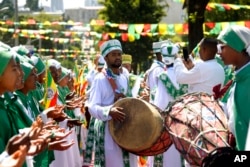Ethiopia's tourism authorities say the industry lost $2 billion during the past two years because of the COVID-19 pandemic and the war in the Tigray region. With the November peace deal between the Ethiopian federal government and the Tigray People's Liberation Front, the Ministry of Tourism is ramping up efforts to revive an industry disrupted by the country's civil war.
Ethiopia's Epiphany festival, known as "Timket" in Amharic and Tigrigna, is expected to attract thousands of Christians during its two-day celebration, which ends today.
Rhoda Berger and her friend Fatima Arnous traveled from Germany and France respectively, and are taking part in Ethiopia's Epiphany festival at Jan Meda, Addis Ababa. The celebration is expected to attract thousands of Christians and other visitors intrigued to learn about the annual religious ceremony.
Berger, who said she is half Ethiopian and half German, said this isn't her first time visiting but the combination of the pandemic and war prevented her from returning since her last visit three years ago in 2020.
"I was actually trying to come last year but then I decided not to because of the conflict and COVID as well," she said. "I really wanted to and I missed it a lot because I have family here and friends here, so I really wanted to come back and I was just waiting until the situation got a bit better."
Her friend, Arnous, said she is visiting Ethiopia for the first time.
"When I read ... newspapers and when I was talking to people and everything, everybody tells me yeah, you have to be careful," Arnous told VOA. "But I guess it's everywhere the same situation and I wanted to visit the country and that's why I'm here."
Members of the tourism sector hope the tide is turning with peace that's taking root.
Henok Abebe, who has worked as a tour guide for over 10 years in the city of Gonder, the epicenter of Timket celebrations, saw work opportunities dwindle to nothing in the past three years as the war worsened and travel restrictions increased. Travel advisories — specifically from western Europe, where Henok said a majority of his guests reside — deeply hurt his business.
During that time, Henok and his fellow tour guides turned to local tourists. But at one point, when Tigrayan fighters had entered the Amhara region, Henok left to join the fighting and volunteered with the regional Amhara militia. .
Ethiopia suffered heavy financial losses from the disruption to tourism, according to Ethiopia's Tourism State Minister Sileshi Girma.
He said because of the impact of the war and COVID-19, an estimated $2 billion has been lost in revenue due to a shortfall of about 3 million tourists.
With hopes of the peace deal holding, the ministry is working on revamping the battered industry. This includes reinstating flights to cities in the Tigray region and opening up historic destinations like the town of Lalibela in the Amhara region where there are rock-hewn churches.
Officials are also looking to lure more visitors from other African countries and the Middle East.





